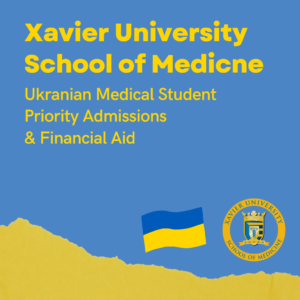The entry into the Clinical Science Program is the most exciting event in every medical student’s career. This is the moment for which they have prepared their entire lives and will, for most, be their very first contact with actual patients in natural clinical settings. Xavier has designed a robust clinical program that will ready the student to enter any field of medicine.
Almost all of our rotations are situated in the United States, with the most substantial concentration of hospitals being in our three centralized “hub” cities of New York, Baltimore, and Chicago. These locations are where most of our core rotations are offered, but there is a vast array of locations where students may choose to spend their electives. At the discretion of the Dean of Clinical Science, students with strong academic performance may be given preferential rotation placement.
The program is structured in such a manner as to allow a student to gain licensure in most of the United States. Each of a student’s core rotations is spent at a hospital that hosts an Accreditation Council for Graduate Medical Education (ACGME)-approved residency program in the respective core specialty. Every site is held to comparable standards of teaching, evaluation, faculty development, and study resources. A student will gain all the knowledge and skills necessary to pass Step 2 of the United States Medical Licensing Examination (USMLE) and compete for any coveted United States residency position. Our students have rotated and gone on to train and practice in Canada as well.
The clinical program is 84 weeks.
| Research and Intro to Clinical Medicine | |
|---|---|
| Research | 8 weeks |
| FMIM1 | 4 weeks |
| Total | 12 weeks |
| Core Rotations | |
|---|---|
| Family Medicine | 6 weeks |
| Psychiatry | 6 weeks |
| Internal Medicine | 12 weeks |
| Obstetrics / Gynecology | 6 weeks |
| Pediatrics | 6 weeks |
| Surgery | 12 weeks |
| Total | 48 weeks |
Students then have 24 weeks in elective rotations. During this time, a student is given the freedom to explore a vast array of available clinical electives. It is also encouraged that a student find or create their own elective experiences. This affords the student an opportunity to match their own interests and abilities to the right field of medicine for them. Once this decision has been made, the elective time also allows a student to showcase their abilities and network with physicians who may help them attain their career goals.
The duration of time in each elective rotation may vary, but a minimum of 4 weeks will be spent in each. A partial list of the possible elective rotations is included below:
| Elective Rotations | |
|---|---|
| Nephrology | Dermatology |
| Hematology and Oncology | Orthopaedic Surgery |
| Rheumatology | Ophthalmology |
| Immunology and Allergy | Otolaryngology (ENT) |
| Gastroenterology | Plastic Surgery |
| Neurology | Colorectal Surgery |
| Cardiology | Occupational Medicine |
| Emergency Medicine | Cardiology (PEDS Focus) |
| Pulmonology | Infectious Disease |


